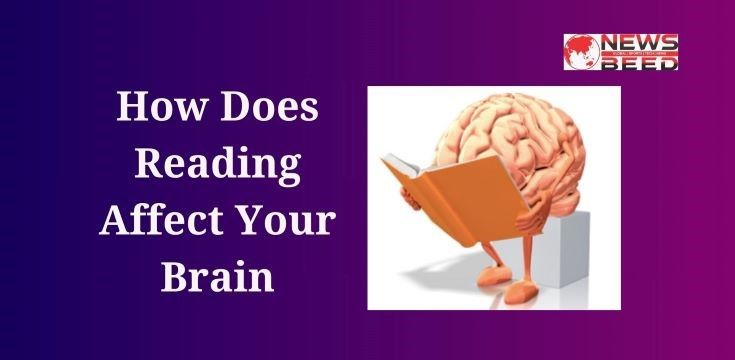Reading is a complex cognitive activity that engages various parts of the brain and affects its structure and function in profound ways. It has been a subject of extensive research, and the findings highlight its remarkable impact on neural connectivity, cognitive development, emotional intelligence, and overall mental health. This essay explores how reading affects the brain, drawing on scientific studies and psychological theories to provide a comprehensive understanding of this intricate process.
Neural Connectivity and Brain Activation
Left Hemisphere Activation
Reading primarily engages the left hemisphere of the brain, which is associated with language processing. When we read, specific regions such as the Broca’s area (responsible for speech production and grammar) and Wernicke’s area (involved in comprehension) become highly active. The visual cortex processes the shapes of letters and words, while the angular gyrus links written words to their phonological representations, facilitating the translation of visual stimuli into language.
Visual and Auditory Processing
The brain’s visual processing areas, particularly the occipital lobe, are activated when we recognize written words. This process involves the identification of shapes and patterns, which are then sent to the brain’s language centers for further processing. Additionally, reading aloud or subvocalizing activates the auditory cortex, which helps in phonological processing and auditory comprehension.
Corpus Callosum
The corpus callosum, a bundle of nerve fibers connecting the left and right hemispheres of the brain, plays a crucial role in reading. It facilitates communication between hemispheres, allowing for the integration of visual and auditory information with linguistic and cognitive processes. This interhemispheric communication is vital for reading comprehension and fluency.
Cognitive Development
Vocabulary Expansion
Reading significantly enhances vocabulary. Exposure to diverse words and complex sentence structures in written texts provides readers with a richer linguistic repertoire. This expanded vocabulary is not only beneficial for communication but also enhances cognitive abilities such as reasoning and problem-solving.
Improved Focus and Concentration
Engaging with a text requires sustained attention and focus. Regular reading practices strengthen these cognitive skills, enabling individuals to concentrate better on tasks and process information more efficiently. This improvement in attention span can have positive effects on academic and professional performance.
Enhanced Memory
Reading involves various memory processes. Short-term memory is engaged when holding information about the plot or characters in mind, while long-term memory is involved in retaining facts and knowledge acquired from the text. This continuous exercise of memory pathways strengthens them, leading to better retention and recall abilities.
Analytical Thinking
Reading, especially complex texts such as literature or scientific papers, fosters analytical thinking. Readers learn to infer meanings, identify themes, and analyze arguments, which enhances critical thinking skills. This analytical approach to information processing is beneficial in academic and professional contexts, where problem-solving and decision-making are crucial.
Emotional and Social Intelligence
Empathy Development
Reading fiction, in particular, has been shown to improve empathy. Engaging with characters’ emotions and experiences allows readers to step into their shoes, fostering a deeper understanding of others’ perspectives. This empathetic engagement enhances social intelligence and improves interpersonal relationships.
Emotional Regulation
Exposure to different narratives and emotional experiences through reading helps individuals better understand and regulate their own emotions. It provides a safe space to explore complex feelings and develop coping mechanisms. This emotional regulation is crucial for mental health and well-being.
Stress Reduction
Reading has been found to be an effective stress-reliever. Immersing oneself in a good book can provide an escape from daily stressors and reduce cortisol levels, promoting relaxation. This stress reduction contributes to overall mental health and can prevent the onset of stress-related disorders.
Structural Changes in the Brain
Increased Grey Matter
Studies have shown that regular reading can lead to increased grey matter density in the brain. Grey matter is associated with muscle control, sensory perception, memory, emotions, and decision-making. This increase in grey matter enhances overall cognitive function and brain health.
Enhanced Connectivity
Reading strengthens the brain’s neural networks, particularly in regions involved in language, memory, and comprehension. This enhanced connectivity improves overall brain function, making cognitive processes more efficient. It also contributes to better mental flexibility and adaptability.
Long-term Benefits
The structural changes induced by reading have long-term benefits for brain health. Engaging in regular reading throughout life has been linked to a reduced risk of cognitive decline and neurodegenerative diseases such as Alzheimer’s. This protective effect is thought to result from the continuous cognitive stimulation and neural engagement provided by reading.
Reading in Childhood and Its Long-term Impact
Early Literacy and Brain Development
Early exposure to reading has a profound impact on brain development in children. It enhances neural connectivity and supports the development of language and cognitive skills. Children who are read to from an early age show better performance in literacy and other academic areas.
Critical Periods
There are critical periods in childhood when the brain is particularly receptive to language and literacy development. During these times, reading can have the most significant impact on neural growth and cognitive development. Ensuring that children have access to books and reading materials during these critical periods is essential for their cognitive and emotional development.
Lifelong Learning
The benefits of early reading extend into adulthood. Individuals who develop strong reading habits early in life are more likely to continue reading and learning throughout their lives. This lifelong engagement with reading promotes continuous cognitive stimulation, enhancing brain health and function over the long term.
Digital Reading and Its Implications
Differences from Traditional Reading
Digital reading, involving e-books and online articles, presents different cognitive and neurological challenges compared to traditional print reading. The brain processes digital text differently, often involving more skimming and less deep reading. This shift can affect comprehension and retention.
Impact on Attention and Comprehension
The hyperlinked and multimedia nature of digital texts can fragment attention and disrupt the linear flow of reading. This fragmentation can hinder comprehension and reduce the depth of engagement with the text. However, with mindful reading practices, individuals can mitigate these effects and benefit from the convenience of digital reading.
Adaptation and Neuroplasticity
The brain’s remarkable ability to adapt, known as neuroplasticity, allows it to adjust to the demands of digital reading. Over time, readers can develop strategies to enhance comprehension and retention of digital texts. This adaptability highlights the brain’s capacity to evolve with changing reading habits and technologies.
Reading as a Therapeutic Tool
Bibliotherapy
Bibliotherapy, the use of reading for therapeutic purposes, has gained recognition for its effectiveness in mental health treatment. It involves using literature to help individuals understand and manage psychological issues. Reading specific texts can provide insights, promote healing, and offer comfort.
Cognitive Behavioral Therapy (CBT)
Reading is often integrated into cognitive behavioral therapy (CBT) programs. Self-help books and workbooks based on CBT principles guide individuals through cognitive restructuring and behavioral modification techniques. This approach empowers individuals to take an active role in their mental health management.
Enhancing Mental Well-being
Reading for pleasure has been linked to improved mental well-being. It offers a form of escapism, providing relief from stress and anxiety. Engaging with uplifting or motivational literature can boost mood and enhance overall psychological resilience.
You May Also Read:
What is Digital Marketing in Hindi
SEO Interview Questions and Answers
Conclusion
Reading profoundly affects the brain, influencing its structure and function in multiple ways. It enhances neural connectivity, cognitive development, emotional intelligence, and mental health. From childhood through adulthood, the benefits of reading are vast and enduring. As our reading habits evolve with technological advancements, the brain’s remarkable adaptability ensures that we continue to reap the cognitive and psychological rewards of this timeless activity. Understanding the impact of reading on the brain underscores the importance of fostering strong reading habits and promoting literacy for all.




